What image will define the 2018 election?
- Written by Bob Britten, Teaching Associate Professor, West Virginia University
Every election has its iconic images. Or does it?
There are standout images from previous campaigns. Barack Obama’s “Hope” poster, with all its homages and parodies, is a classic example.
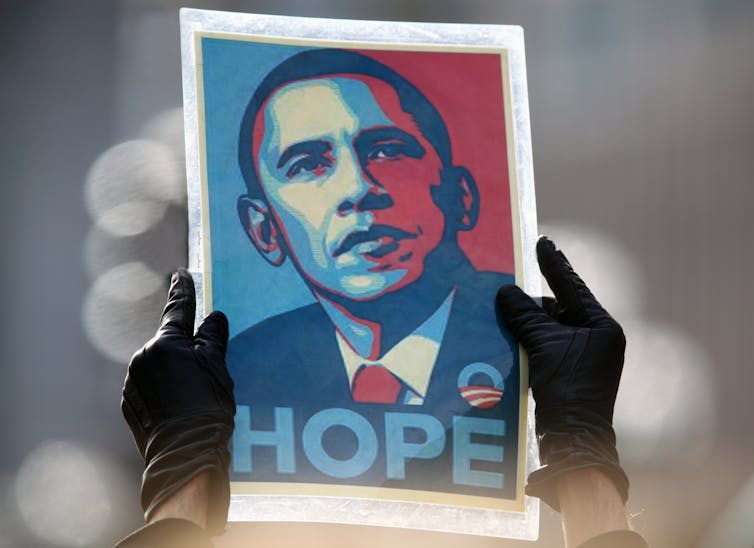 A supporter holds the poster of Barack Obama by Shepard Fairey, in Wisconsin, Nov. 5, 2012.
Shutterstock, Juli Hansen[1]
A supporter holds the poster of Barack Obama by Shepard Fairey, in Wisconsin, Nov. 5, 2012.
Shutterstock, Juli Hansen[1]
George W. Bush’s “Mission Accomplished” banner dogged him through his 2004 campaign and beyond[2].
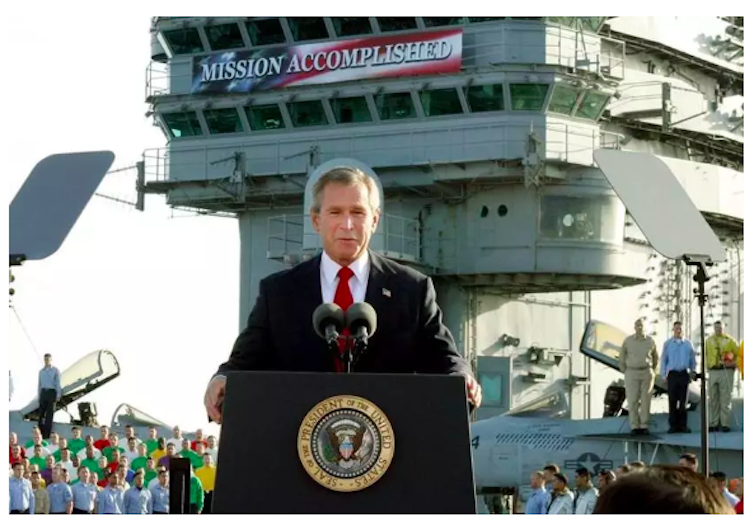 The image that haunted George W. Bush’s re-election efforts.
Boston Globe screenshot
The image that haunted George W. Bush’s re-election efforts.
Boston Globe screenshot
Michael Dukakis’ ill-advised 1998 photo in a tank was widely seen as “a huge mistake[3].”
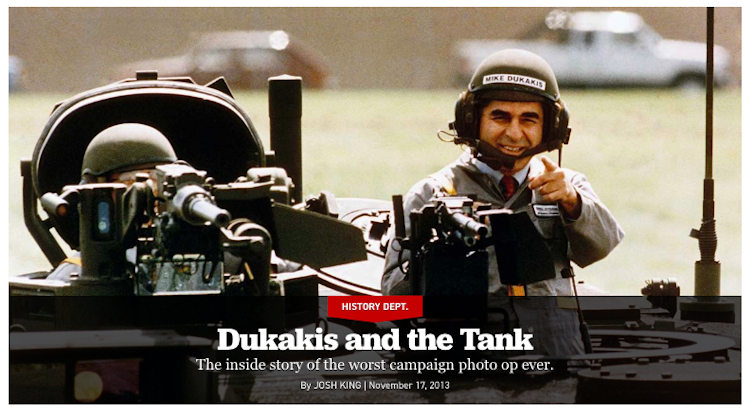 This shot of presidential candidate Michael Dukakis damaged his candidacy.
Politico screenshot
This shot of presidential candidate Michael Dukakis damaged his candidacy.
Politico screenshot
But this campaign season seems to work on different principles. As someone who’s worked in news design and graphics and now teaches these subjects[4], I’ve spent a good bit of attention on news visuals. To me, it seems like in 2018, images just don’t seem to stick in the same way as they used to.
As the midterm campaigns got underway, images appeared that were used to characterize the politics of one side or the other. One June image that circulated widely showed a crying Honduran child allegedly separated from her parents at the border. Later we learned she and her mother were detained together[5].
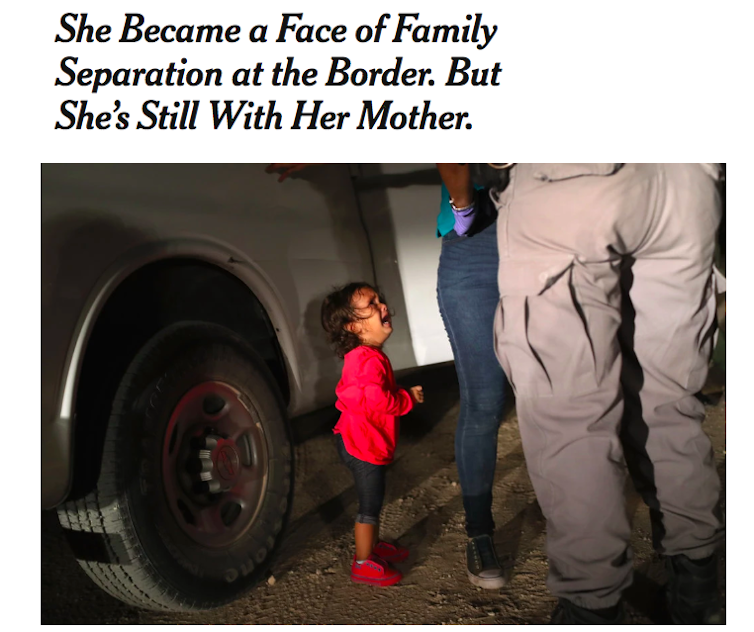 Screenshot from The New York Times of photo taken by Getty photographer John Moore.
New York Times screenshot
Screenshot from The New York Times of photo taken by Getty photographer John Moore.
New York Times screenshot
Also widely seen were photos of now-Justice Brett Kavanaugh and his accuser, Dr. Christine Blasey Ford, from Kavanaugh’s confirmation hearing.
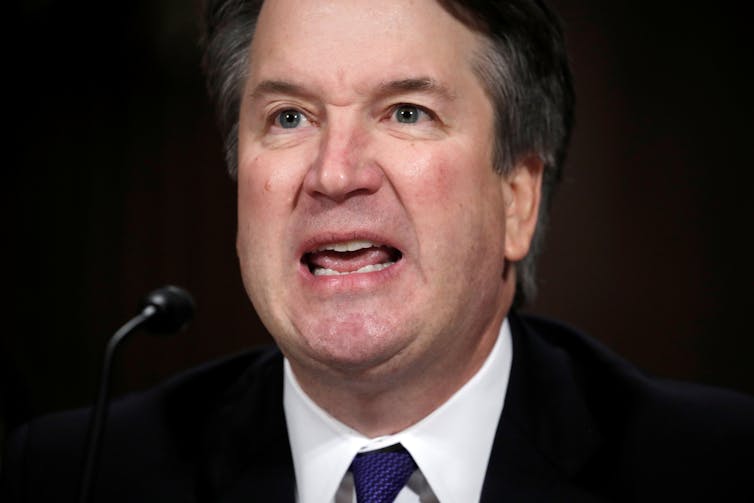 Brett Kavanaugh during his confirmation hearings.
REUTERS/Jim Bourg[6]
Brett Kavanaugh during his confirmation hearings.
REUTERS/Jim Bourg[6]
These images had some staying power, but they haven’t been notably present in the late campaign. The Honduran child image, seemingly good material for a campaign focused on immigration policy, didn’t make any significant October appearances, and while Kavanaugh’s impassioned, sometimes sneering face has been decent meme fodder, there’s not really one single image that’s persisted.
Maybe that’s the difference. Thinking of icons as single images is so 20th century, a time when cameras were far less ubiquitous. But we’re all documenters[7] and publishers now, and the photos we see come from a much wider range of sources.
Yet there is an image that shows up again and again this campaign season. It’s not a specific photo, it’s the face of a man, one who isn’t currently on the ballot.
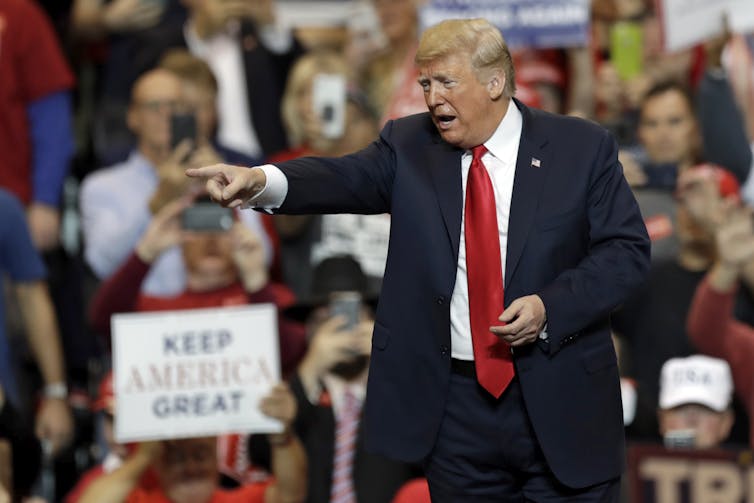 President Donald Trump at a campaign rally, Nov. 5, 2018, in Cleveland.
AP/Tony Dejak[8]
President Donald Trump at a campaign rally, Nov. 5, 2018, in Cleveland.
AP/Tony Dejak[8]
President Trump is a presence in nearly all election media. His photo broods alongside his tweets, gazes nobly on Fox News and gawps foolishly in the images of MSNBC and elsewhere. There’s no single Trump image that stands out and no prominent images of him doing something – as with Bush or Dukakis – but his face is everywhere, inescapable.
Better photos may win awards, but the photos that stick have become a broad pool that reflects personalities, not events. Trump’s no Kim Kardashian, but their shared sense of visual branding defines this campaign, and this era, far more than any substantive moment: Today’s photographic icons may not depict what happened so much as who happened.
References
- ^ Shutterstock, Juli Hansen (www.shutterstock.com)
- ^ and beyond (www.bostonglobe.com)
- ^ a huge mistake (www.politico.com)
- ^ teaches these subjects (reedcollegeofmedia.wvu.edu)
- ^ were detained together (www.nytimes.com)
- ^ REUTERS/Jim Bourg (pictures.reuters.com)
- ^ we’re all documenters (www.pewinternet.org)
- ^ AP/Tony Dejak (www.apimages.com)
Authors: Bob Britten, Teaching Associate Professor, West Virginia University
Read more http://theconversation.com/what-image-will-define-the-2018-election-106441

